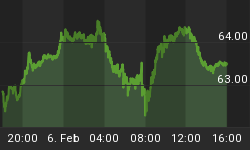Recent surveys show Americans are growing slightly more confident in the US economy - albeit slowly. Ironically, this runs directly opposite to market action as of late, with money having piled into US Treasury bonds over the past several years as investors flock to safety.
Even more ironic is that this trend is hardly new; it has happened repeatedly throughout history right at the end of a cycle that culminates in the investing public flocking from equities. In each instance, people pile into debt investments precisely when they shouldn't.
In 1949, for example, the consensus was that the United States was sitting on the verge of another great depression. After suffering the Great Depression, US manufacturing had come roaring back throughout World War II; now millions of Americans were returning from the war. There were widespread fears that not enough jobs existed for these returning soldiers.
Instead of tanking, the US economy entered a period of massive growth.
The same thing happened in the late 1970s after a lost decade culminating under President Carter. Again, the investing public refused to buy equities at just the time they should've been. After Reagan's election both the economy AND equity investments took off.
These lost decades come along periodically - roughly 10-year stretches where stocks end up almost precisely where they started. Examples can be seen in the 1930s, the '70s, and the 2000s. Also, usually somewhere during each lost decade is 1-2 year period that is a complete disaster for investors: 1973-74, or more recently 2008-09.
By the ends of these lost decades the investing public is typically fleeing the markets; they've had enough suffering and feel like they aren't being adequately compensated for risk. Sadly, these almost always turn out to be precisely the times when they should be BUYING, not selling.
While 1949 didn't come at the end of a lost decade, the lesson holds true. When people are getting so pessimistic that it's hart to tell whether there's a light at the end of the tunnel or an oncoming train, investors should be buying. To paraphrase one of the Rothschilds: "buy when there's blood in the streets, even if it's your own."
Eventually, just as they have throughout history, the tides will turn. The trends that we've been seeing will stop and even reverse course. Interest rates will start up; bond prices, which have been high the last several years as investors flock to safety, will begin to fall.
Sooner or later money flows will reverse, with funds flowing into equity rather than flocking to debt. As is usually the case, by the time the public catches on, most of the big money will have been made in equities - and a LOT of money will have been lost in bonds.
Even after the big money has been made, investing in equities will help the economy continue to improve. Such investment will spur economic growth and new innovations, helping this country see another Reagan-style boom that is quickly headed this way.
Some Americans are afraid of a Romney victory, despite the fact that it's becoming more and more likely as November draws near. Nevertheless, some people continue to believe that having Romney in the White House will adversely affect their lifestyle. It's important to remember that, on net, the American people were better off after Reagan than before. Unfortunately, the same can't necessarily be said for our current president. Our only hope now is that President Romney can unleash the growth that typically follows a lost decade.















